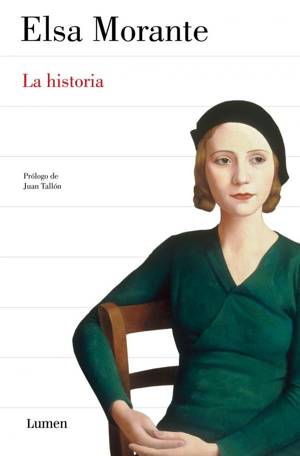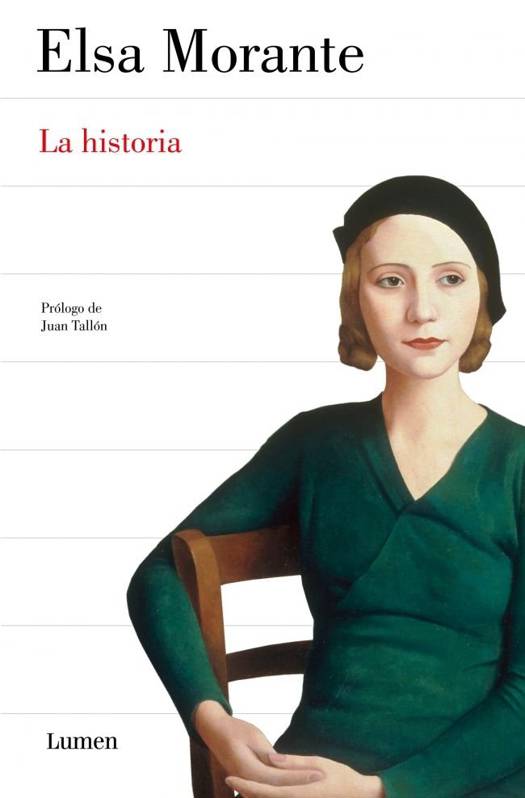
- Afhalen na 1 uur in een winkel met voorraad
- Gratis thuislevering in België vanaf € 30
- Ruim aanbod met 7 miljoen producten
- Afhalen na 1 uur in een winkel met voorraad
- Gratis thuislevering in België vanaf € 30
- Ruim aanbod met 7 miljoen producten
Zoeken
Omschrijving
La historia es un clásico del siglo XX y un referente para las actuales generaciones de escritores. El retrato de una familia humilde que resume los momentos más duros de la Segunda Guerra Mundial. «Elsa Morante fue mi maestra. [...] Es hechizante. He intentado aprender de sus libros, pero me parecen insuperables.» --Elena Ferrante Un día de enero de 1941 un soldado alemán callejea por el barrio de san Lorenzo de Roma, y en ese caminar sin rumbo, con unas copas de más en el cuerpo, el joven se topa con Ida, una maestra viuda y madre de un hijo, que vuelve a casa después del trabajo. Vemos a una mujer de mirada sumisa y caderas anchas, que no invitan a la seducción, pero el tiempo apremia. Al día siguiente el soldado se irá para siempre y cualquier abrazo le vale. El hombre sigue a Ida hasta el piso humilde que comparte con su hijo. La viola, luego sonríe como disculpándose, se fuma un pitillo, se marcha y nunca más sabremos de él. De este acto banal en su brutalidad nacerá un niño, y la historia de la familia de Ida va a llenar las páginas de una novela que iluminó todo el siglo XX y aun proyecta una luz intensa en la realidad de hoy. Ida y sus hijos no son partícipes en primera persona de la guerra que asola Europa, y ni siquiera tienen valor para declararse víctimas: son comparsas, animales tristes que muestran su miseria sin reprochar nada a nadie. Sin embargo las palabras de Elsa Morante, su modo de escribir tan visceral y próximo, los rescata para siempre y nos los entrega más vivos que nunca. Ella es la cronista de una historia sin Historia, y su mirada no es piadosa porque no lo necesita. Ida, Useppe, Nino: basta con acompañarlos para no olvidar. ENGLISH DESCRIPTION History is a twentieth-century classic and a standard for current generations of writers. The portrait of a humble family that summarizes the toughest moments of World War II. On January, 1941, a German soldier wanders around the San Lorenzo di Roma neighborhood, and in his aimless walk, after having a few too many, bumps into Ida, a widowed teacher and mother, returning home from work. We see a woman with candid eyes and broad hips that doesn't invite seduction, but time is of the essence. The soldier is leaving in the morning, maybe forever, and any embrace will do. The man follows Ida to the humble apartment she shares with her son. He rapes her, then smiles as if apologizing, smokes a cigarette, leaves, and we never hear from him again. From this mundanely brutal act a boy is born, and Ida's family history will fill the pages of a novel that cast a light on the entire twentieth century and still illuminates reality today. Ida and her children are not personally involved in the war devastating Europe, and they don't even have the courage to call themselves victims: they are a troupe, sad animals that display their misery without blaming anyone for anything. However, Elsa Morante's words, her visceral forthcoming narrative rescues them forever and surrenders them to us more alive than ever. She is the chronicler of a story without History, and her eyes hold no pity because there is no need for it. Ida, Useppe, Nino: walking alongside them is enough to never forget.
Specificaties
Betrokkenen
- Auteur(s):
- Uitgeverij:
Inhoud
- Aantal bladzijden:
- 950
- Taal:
- Spaans
Eigenschappen
- Productcode (EAN):
- 9788426425904
- Verschijningsdatum:
- 11/02/2023
- Uitvoering:
- Paperback
- Formaat:
- Trade paperback (VS)
- Afmetingen:
- 150 mm x 230 mm
- Gewicht:
- 1150 g

Alleen bij Standaard Boekhandel
+ 110 punten op je klantenkaart van Standaard Boekhandel
Beoordelingen
We publiceren alleen reviews die voldoen aan de voorwaarden voor reviews. Bekijk onze voorwaarden voor reviews.








